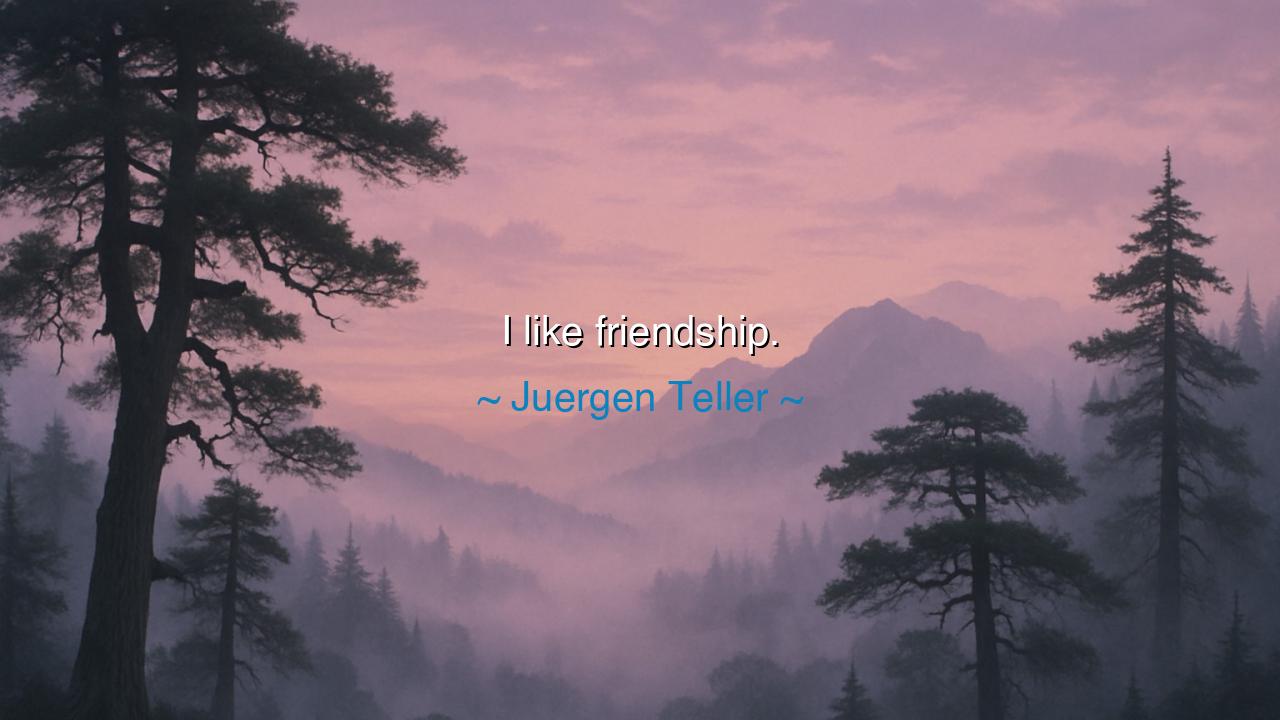
I like friendship.






Hear the humble yet profound words of Juergen Teller, the photographer who captures life not in perfection, but in truth: “I like friendship.” Three simple words — yet within their quiet simplicity lies a truth vast as the human heart itself. Teller, known for his raw, unfiltered portraits of people in their most authentic states, speaks here not as an artist, but as a man who understands the sacred beauty of connection. In a world obsessed with image, fame, and distance, he reminds us of something elemental — that friendship, in its purest form, is one of life’s greatest acts of art.
Juergen Teller, a German artist whose work strips away glamour to reveal honesty, has spent his career searching for the soul behind the mask. His statement, “I like friendship,” is born not from sentimentality, but from deep observation. Through his lens, he has seen that what binds people — across cultures, professions, and lives — is not status or achievement, but the fragile thread of trust and understanding. In friendship, he finds the same truth he seeks in photography: the unguarded moment, the shared vulnerability, the quiet presence of one soul beside another. Thus, when he declares his love for friendship, it is not as a passing fondness, but as a declaration of faith in human connection itself.
The ancients, too, revered friendship as one of the highest forms of virtue. Aristotle taught that friendship based on goodness is “a single soul dwelling in two bodies.” Such friendship, he said, is not built on pleasure or utility, but on the recognition of another’s inner beauty — a harmony of spirit. Teller’s words echo this ancient wisdom. His art, like true friendship, does not seek perfection but truth. He loves friendship because it allows us to be seen — truly seen — without adornment or disguise. In a world that celebrates masks, to find someone before whom you can stand unmasked is to find something divine.
Consider the friendship between Vincent van Gogh and Paul Gauguin, two artists bound by vision and passion. Their companionship was intense, volatile, and transformative. In each other’s company, they found inspiration and challenge — a mirror for their genius and their pain. Though their friendship ended in rupture, its flame burned so bright that it changed art forever. This is the paradox Teller’s words capture: friendship, even when imperfect, reveals the raw truth of our humanity. To love friendship is to love life itself — in all its beauty, conflict, and imperfection.
In saying “I like friendship,” Teller also reminds us of the simplicity that modern hearts have forgotten. We live in an age where relationships are transactional, where communication is instant but connection is rare. Yet Teller’s art — often filled with awkwardness, laughter, or the strange intimacy of imperfection — teaches that friendship does not need grandeur. It thrives in the small things: a shared silence, a kind word, a hand resting on the shoulder. True friendship does not demand, it gives; it does not perform, it simply exists. It is, as Teller suggests, something to be liked — to be enjoyed as naturally as sunlight or laughter.
There is a heroic gentleness in this love of friendship. For to value friendship is to value humanity itself. It means believing that goodness still lives in others, that connection is still possible in a fractured world. Teller, through his quiet statement, stands against the coldness of indifference and cynicism. His love of friendship is an act of rebellion — a belief that warmth, kindness, and shared presence still matter. Just as his photographs refuse to conform to artificial beauty, his affection for friendship refuses to bow to superficial connection.
The lesson, then, is clear and timeless: cherish your friendships. Do not take lightly the gift of being truly known by another. In a life filled with chaos and noise, nurture those bonds that bring peace. Be honest, be kind, be patient — for friendship, like art, must be tended with care. And do not seek perfection in your friends; seek sincerity, for it is the heart that matters, not the flawlessness of the frame.
So, dear listener, remember Juergen Teller’s simple wisdom: “I like friendship.” Say it as he meant it — not as a passing phrase, but as a declaration of reverence. Like the artist who loves light, love your friends — for they are the mirrors in which you see your truest self. Walk beside them through laughter and through storm. Celebrate their joys, forgive their faults, and stand with them when the world grows cold. For when all else fades — the fame, the art, the years — what remains, shining softly through time, is friendship: the most human, and the most beautiful, of all creations.






AAdministratorAdministrator
Welcome, honored guests. Please leave a comment, we will respond soon